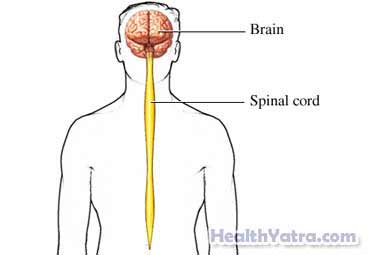Definition
Subacute sclerosing panencephalitis (SSPE) is a condition that affects the brain and spine. It is a gradual break down of nerve cells from constant swelling.
When left untreated, SSPE almost always leads to death. Contact your doctor right away if you think you or your child may have this condition.

Causes
SSPE is caused either by an altered form of the measles virus or an abnormal immune response to measles. It occurs anywhere from 2-10 years after contracting measles.
Risk Factors
Factors that may increase the risk of SSPE include:
- Age: 5-15 years old
- Gender: male
- Measles infection in infancy
- Not being vaccinated against measles
- Ethnicity:
- Arabs and Sephardic Jews have an incidence that is six times higher than Ashkenazi Jews.
- Caucasians have a four-fold higher incidence than African Americans in the United States.
Symptoms
Symptoms of SSPE may include:
- Abnormal behavior
- Irritability
- Loss of intellectual abilities
- Memory loss
- Involuntary movements
- Seizures
- Inability to walk
- Speech impairment with poor understanding
- Difficulty swallowing
- Blindness
- Muteness
- Loss of consciousness
Diagnosis
Your doctor will ask about your child’s symptoms and medical history. A physical exam will be done.
Your bodily fluids may be tested. This can be done with blood tests.
Images may need to be taken of your bodily structures. This can be done with:
- Electrocardiogram (ECG, EKG)
- Computed tomography (CT) scan
- Magnetic resonance imaging (MRI) scan
Treatment
Talk with your doctor about the best treatment plan. Treatment options include:
Supportive Therapy
With advanced disease, tube feedings and nursing care may be necessary.
Medications
Anticonvulsant medications can reduce some symptoms of SSPE. In addition, there is some evidence that certain medications may help stabilize the disease and/or delay its progression. These may include:
- Inosine pranobex
- Interferon alpha
- Interferon beta
- Ribavirin
Prevention
The best way to prevent SSPE is to get immunized to avoid contracting measles. The measles vaccine is generally given at 12-15 months of age and again at 4-6 or 11-12 years. If you have not been vaccinated, avoid contact with people who are infected with measles until all of their symptoms are gone.
